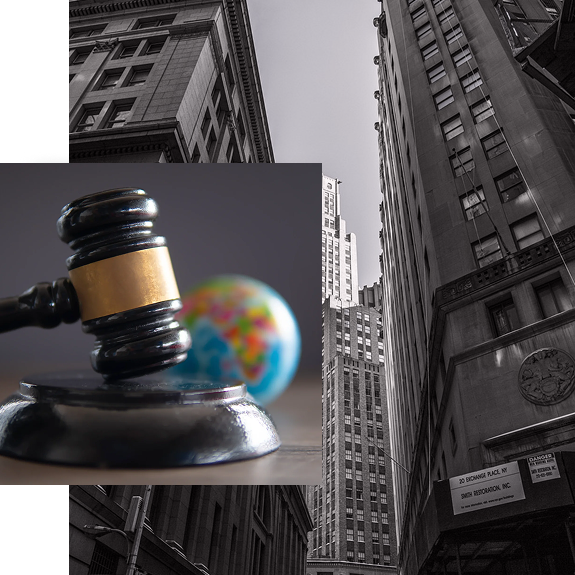Kinhal Law
Trademark Oppositions
Navigating Intellectual Property Challenges in New York
Trademark Opposition Proceedings
When a business applies for a trademark, it doesn’t automatically receive protection. The application goes through several steps, including a publication period where others have the chance to oppose your trademark’s registration. If a trademark is too similar to yours, misleading, or could harm your brand’s reputation, you may need to file an opposition to stop it from being registered. This process, known as trademark opposition proceedings, takes place before the Trademark Trial and Appeal Board (TTAB) and can be a crucial step in defending your business identity.
At Kinhal Law, we help businesses navigate these proceedings efficiently, ensuring that their trademarks remain strong and uncontested. If you’re facing a potential conflict, here’s what you need to know about trademark opposition and how the process unfolds.

Understanding Trademark Opposition Proceedings
Once a trademark application passes its initial review by the United States Patent and Trademark Office (USPTO), it is published in the Official Gazette. This publication gives the public a 30-day window to oppose the application. If no one files an opposition, the trademark moves forward toward registration. However, if a business or individual believes the applied-for mark infringes upon their existing rights or causes harm to their trademark, they can file a Notice of Opposition to challenge it’s registration.
The Trademark Trial and Appeal Board (TTAB) oversees opposition proceedings. While the TTAB operates similarly to a courtroom, the process is more streamlined and conducted primarily through written arguments, evidence submissions, and, in some cases, oral hearings. Unlike traditional lawsuits, these proceedings do not involve financial damages—only decisions about whether a trademark should be registered.
Who Can File a Trademark Opposition?
To file an opposition, the party must have a legitimate interest in preventing the trademark from being registered. This typically includes:
Existing trademark owners who believe the new mark is too similar to theirs.
Businesses using a similar name or logo in commerce, even if they don’t have a federal registration.
Industry competitors who believe the trademark is misleading or could create unfair competition.
Consumer advocacy groups or individuals who argue the trademark is deceptive or offensive or believe they could be harmed in some way by the trademark’s registration.
The key is proving that the applied-for mark could harm your business or cause confusion among consumers.
Common Grounds for Opposition
Opposing a trademark isn’t about personal preference—it must be based on legal grounds. Some of the most common reasons for opposition include:
Likelihood of Confusion
If the new trademark is too similar to an existing one in appearance, sound, meaning, or overall impression, it could mislead consumers. The TTAB looks at factors like:• The similarity of the marks
• The relatedness of the goods or services
• Whether the trademarks are marketed to the same consumers
If confusion is likely, the opposition has a strong chance of success.
Trademark Dilution
Even if a new trademark doesn’t directly confuse consumers, it could weaken a famous brand’s uniqueness. This is called dilution, and it applies to well-known trademarks that could lose their distinctiveness if similar marks are allowed to register.
Descriptiveness or Generic Terms
Some trademarks should not be registered because they merely describe the product. For example, a company selling fresh apples cannot register the term “Fresh Apples” as a trademark because it is too generic. If a business tries to claim exclusive rights to a common phrase, an opposition can challenge the registration.
Fraud or Bad Faith Applications
If an applicant knowingly provides false information—such as lying about using the mark in commerce—this can be grounds for opposition. Similarly, some businesses apply for trademarks in bad faith, hoping to block competitors or sell the rights for a profit. These cases require strong evidence but can lead to the application being denied.
Deceptive or Offensive Trademarks
A trademark can also be opposed if it is misleading, offensive, or falsely suggests a connection with another entity. For instance, a company cannot register a mark that falsely implies government approval or a connection to a well-known figure or organization.
The Trademark Opposition Process
Filing the Notice of Opposition
The opposition process begins when the opposing party files a Notice of Opposition with the TTAB. This document outlines:• The legal grounds for opposition
• The opposer’s interest in the case
• Evidence supporting the claim
This must be filed within 30 days of publication in the Official Gazette. If additional time is needed, extensions can be requested (typically a 30 day automatic extension or a 90 day extension for good cause).
The Applicant’s Response
The applicant has 40 days to respond by filing an Answer to the opposition. If additional time is needed, the applicant can typically request a 30 day extension. In this response, they can either defend their right to the trademark or, in some cases, negotiate a settlement with the opposer.
Discovery Phase
Once the opposition is officially underway, both sides enter the discovery phase, where they exchange evidence, take depositions, and gather information to support their case. This phase is crucial for building a strong argument, as it allows both parties to understand the strengths and weaknesses of their opponent’s position.
Trial and Submissions
Unlike a traditional courtroom trial, most TTAB cases are handled through written submissions. The parties submit legal briefs, sworn declarations, and supporting evidence. However, in some cases, oral arguments may be scheduled before the TTAB panel.
TTAB Decision
Once all evidence and arguments are submitted, the TTAB reviews the case and issues a written decision. If the opposition is successful, the applicant’s trademark will be refused registration. If the TTAB rules in favor of the applicant, the trademark proceeds to registration.
Potential Outcomes of an Opposition
Trademark opposition proceedings can end in several ways:
Successful Opposition – The TTAB agrees with the opposer, and the trademark is refused registration.
Trademark Registration Approved – The opposition is denied, and the trademark moves forward with registration.
Settlement or Withdrawal – In some cases, the parties negotiate an agreement. This might involve modifying the applied-for trademark, limiting its use, or voluntarily withdrawing the application.
Why Trademark Opposition Matters
Taking action against a conflicting trademark early can prevent bigger problems down the road. If a similar trademark is registered, it could:
Confuse customers and harm your brand reputation
Make it harder to enforce your trademark rights later
Lead to legal disputes that are more complex and expensive
By participating in the opposition process, businesses can protect their brand identity and ensure their trademarks remain distinct.

How Kinhal Law PLLC Can Help
Navigating trademark opposition proceedings requires careful legal strategy and strong evidence. At Kinhal Law PLLC, we help businesses:
Monitor newly published trademarks for potential conflicts
File strong oppositions with well-documented legal arguments
Defend against oppositions if your application is challenged
Negotiate settlements to avoid prolonged disputes
Represent clients in TTAB proceedings to protect their brand
Whether you need to file an opposition or defend your trademark application, we work with you every step of the way to ensure the best possible outcome. To discuss your trademark concerns, contact Kinhal Law or visit www.kinhallaw.com.
Our Story
Learn more about our passion for protecting your brand
At Kinhal Law, we are your trusted partner in navigating the intricate world of intellectual property. We excel in patent, trademark, and copyright matters and specialize in providing comprehensive legal support to inventors and creators.

Other Trademark Services

our foundation
Credentials, Associations & Achievements
Beyond protection, we extend our expertise to intellectual property licensing, crafting strategic agreements to unlock the full potential of your intangible assets. In the realm of disputes, Kinhal Law stands as your formidable ally, offering strong representation in intellectual property litigation. Your creativity and innovation deserve our meticulous care.
Our Success
Hear From Our Satisfied Clients
Our expertise made the process seamless and stress-free.
Our Goal
Let’s Make Your Brand Bulletproof
We’re here to grow and protect your brand the right way.











